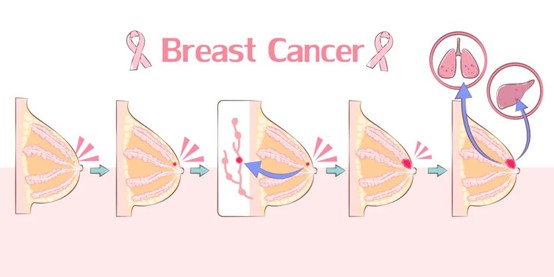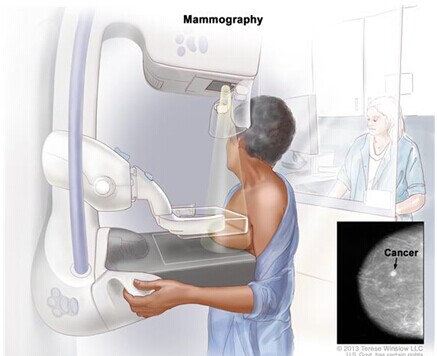Breast Lump → Late-Stage Breast Cancer
Her name is Xu. She had just celebrated her 23rd birthday when she was diagnosed with advanced breast cancer in June 2024. In fact, a lump had appeared in her right breast as early as June 2023, but since it wasn’t painful, she didn’t take it seriously.
By 2024, Xu began experiencing chest and back pain, along with pain in her ribs. Coincidentally, she had just started working out around that time, so her parents thought the discomfort was due to muscle strain or lactic acid buildup. However, the pain worsened and was accompanied by recurrent fevers. When she finally went to the local hospital for a check-up, the diagnosis was devastating: right breast cancer with metastases to the right axillary and left supraclavicular lymph nodes, multiple bone metastases, and liver metastases. A biopsy confirmed it was invasive ductal carcinoma (Stage IV).

“At first, my parents hid the truth from me, afraid I wouldn’t be able to handle it,” said Xu.
She only learned the truth after the persistent bone pain and recurring fevers made sleep impossible. Just as her parents had feared, Xu found it hard to accept that she had advanced cancer in her early twenties.
Breast Cancer Is Not Just for “Older People”
Although women aged 45–55 are at the highest risk for breast cancer in China, it doesn’t mean younger women are entirely safe. In clinical practice, there are many young patients like Xu.
So, why do some women develop breast cancer at such a young age?
Aside from genetic predisposition, the rising incidence of breast cancer in younger women is closely linked to modern lifestyles. Long-term sleep deprivation, high work stress, irregular eating habits, and lack of exercise can all lead to hormonal imbalances, increasing the risk of breast cancer.
In Xu’s case, her lifestyle was particularly unhealthy:
She worked under heavy pressure, often returning home after 11 p.m.
Rarely ate at home and mostly relied on takeout.
Frequently stayed up late, sleeping around 1 or 2 a.m.
Often bottled up emotions and argued with her parents.
...
The accumulation of these risk factors ultimately led to her breast cancer diagnosis. Therefore, young women are advised to maintain a healthy routine and balanced diet, and manage stress effectively.
With limited knowledge about cancer, Xu’s parents searched for information and medical advice from various sources. She eventually received a combination of targeted therapy and endocrine therapy at a local hospital. Follow-up scans showed a reduction in the tumor size.
However, considering her young age and the fact that she was unmarried and had no children, Xu chose to discontinue treatment after four cycles and instead opted for traditional Chinese medicine to nourish her blood and boost her immune system.
Multidisciplinary Internal Medicine Treatment to Counter Multiple Lesions
At the beginning of 2025, Xu's recurring fevers and worsening lower back pain severely impacted her mobility — she had to rely on a wheelchair to get around. Realizing that Chinese medicine alone was insufficient, her parents sought further help and managed to book an appointment with Dr. Niu Lizhi, the President of Fuda Cancer Hospital in Guangzhou. In February, Xu was admitted to Medical Oncology Department IV.
“A high-metabolism tumor was found in the right breast, along with multiple bone metastases and widespread lymph node metastases…”
When Dr. Niu and her attending physician Dr. Yang Ting saw Xu enter the consultation room with the support of her parents, they were heartbroken. They were determined to help her return to a normal life through scientifically based, personalized treatment.
Based on her medical history and genetic test results, and with full consent from Xu and her family, the medical team proposed a comprehensive anti-cancer plan: chemotherapy combined with targeted therapy to control systemic tumors.
For the breast lesion on the right side, minimally invasive treatment was scheduled based on her condition. To treat bone metastases, she was given denosumab to protect bone health. As for spinal metastases that were causing progressive muscle weakness in her lower limbs, Xu and her family declined radiotherapy, so she continued with internal medicine anti-tumor treatment and supportive care.
After the first cycle, the lymph node metastasis in her right armpit shrank significantly, bone pain eased, and she could walk with the support of a brace.
After the second cycle, pain in her lower back, upper back, and sternum improved noticeably.
After the third cycle, her tumor markers returned to normal, and the breast mass became smaller and softer.…
By the fifth cycle, everyone received the thrilling news: The previously high-metabolic tumor lesions throughout her body had significantly reduced or even disappeared. Her primary breast tumor, multiple bone metastases, and lymph node metastases had all shrunk dramatically. The cancer activity was nearly completely suppressed.

Before and After Treatment
Upon learning from her test results that her tumors had regressed, Xu and her family were overwhelmed with emotion. Tears of joy flowed as they hugged Dr. Yang Ting, expressing heartfelt gratitude again and again. To them, Dr. Yang’s gentle voice and comforting presence had lifted the cloud of pain and despair.
It was thanks to Fuda’s multidisciplinary medical team, the individualized and precise treatment plan developed by Department IV, and the wholehearted efforts of the entire staff that Xu was able to recover so quickly and embrace a healthier, brighter future.

This moment of recovery is certainly worth celebrating, but we must also recognize that cancer prevention and control is a long-term battle. To prevent recurrence or disease progression, Xu and her family must remain vigilant, strictly follow medical advice, complete follow-up treatments on schedule, and attend regular check-ups.
An optimistic mindset is the foundation for lasting recovery and health. Only by transforming the joy of recovery into ongoing scientific management and a healthy lifestyle can true and lasting well-being be achieved.

